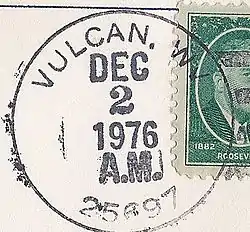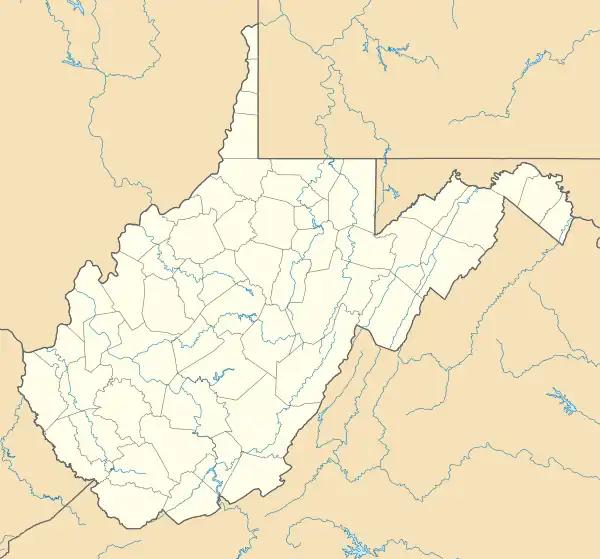Vulcan, West Virginia
Vulcan is an unincorporated community in Mingo County, West Virginia, United States. Vulcan is located along the Tug Fork across from the state of Kentucky. The community was named after Vulcan, the god of fire in Roman mythology.[2] Vulcan received international attention when they requested aid from the Soviet Union to replace a collapsed bridge, the only legal entrance and exit into the community.[3]
Vulcan, West Virginia | |
|---|---|
 Postmark from Vulcan, West Virginia | |
 Vulcan, West Virginia  Vulcan, West Virginia | |
| Coordinates: 37°33′08″N 82°07′33″W | |
| Country | United States |
| State | West Virginia |
| County | Mingo |
| Elevation | 738 ft (225 m) |
| Time zone | UTC-5 (Eastern (EST)) |
| • Summer (DST) | UTC-4 (EDT) |
| ZIP codes | 25697 |
| Area code(s) | 304 & 681 |
| GNIS feature ID | 1555899[1] |
Vulcan was originally settled as a coal-mining community in the early 20th century, but by 1968 the coal supply had been exhausted and the town experienced significant depopulation.[4]
Bridge
Vulcan lacked a road connection to the rest of West Virginia and relied on a swinging bridge across the Tug Fork to Kentucky Route 194. The bridge was too narrow for vehicular traffic and had deteriorated by the early 1970s with missing boards.[4]
In 1974–75, the bridge had completely collapsed due to wood rot, and the mayor of Vulcan had unsuccessfully lobbied both the state and federal government to replace it.[5][6] Because of a lack of action the self-appointed mayor of Vulcan, John Robinette, in 1977 requested foreign aid from the Soviet Union and East Germany to replace the town's bridge.[7] Soviet journalist Iona Andronov visited Vulcan on December 17, 1977, to meet with Robinette and survey the problem. Within an hour of his visit, reporters were told that the state would replace the bridge. The West Virginia Legislature provided $1.3 million in funding to replace the bridge which opened in 1980.[3][8][9]
References
![]() Media related to Vulcan, West Virginia at Wikimedia Commons
Media related to Vulcan, West Virginia at Wikimedia Commons
- "US Board on Geographic Names". United States Geological Survey. October 25, 2007. Retrieved January 31, 2008.
- Kenny, Hamill (1945). West Virginia Place Names: Their Origin and Meaning, Including the Nomenclature of the Streams and Mountains. Piedmont, WV: The Place Name Press. p. 652.
- writer, Caity Coyne Staff (March 3, 2018). "Plight of Nolan residents stirs memories of 'bridge the Russians almost built'". Charleston Gazette-Mail. Retrieved September 24, 2021.
- "A West Virginia Town Applied For Soviet Foreign Aid, and Other Lesser Known American History Facts". HistoryCollection.com. February 21, 2020. Retrieved September 24, 2021.
- "West Virginia Town/Access Problem CBS Evening News for Friday, Aug 12, 1977". Vanderbilt Television News Archive. Archived from the original on February 28, 2018. Retrieved March 7, 2018.
- Times, Gregory Jaynes Special to The New York (December 16, 1978). "Stranded Mining Town Awaits Bridge". The New York Times. ISSN 0362-4331. Retrieved September 24, 2021.
- AppalachianMagazine. "The West Virginia Town That Applied For Soviet Foreign Aid | Appalachian Magazine". Archived from the original on February 25, 2018. Retrieved September 24, 2021.
- DePARLE, JASON (July 22, 1991). "West Virginia Roads: A Bumpy Legacy Lives On". The New York Times. ISSN 0362-4331. Retrieved February 26, 2018.
- "West Virginia Bridge Being Built Without Russian Aid". Ocala Star-Banner. January 2, 1980. Retrieved February 25, 2018 – via Google Newspaper Archive.

